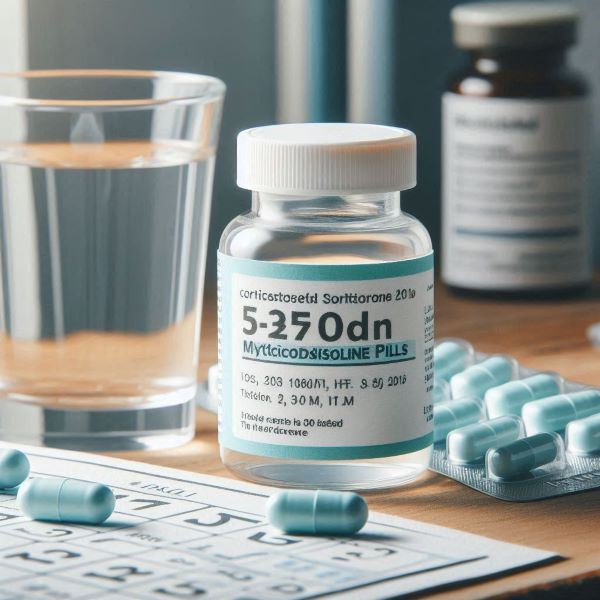Methylprednisolone is a powerful corticosteroid medication widely used in medical practice for its anti-inflammatory and immunosuppressive properties. It plays a crucial role in managing various conditions, from autoimmune diseases and allergies to more severe inflammatory disorders. This article provides an in-depth look at methylprednisolone, detailing its uses, benefits, side effects, availability, and frequently asked questions. (Source)
What is Corticosteroid Methylprednisolone?
Methylprednisolone is a synthetic corticosteroid that mimics the action of cortisol, a hormone produced by the adrenal glands. It is available in various forms, including oral tablets, injectable solutions, and topical creams. Methylprednisolone is commonly used in conditions that require strong anti-inflammatory and immunosuppressive effects. (Source)
How Does Methylprednisolone Work?
Methylprednisolone works by binding to glucocorticoid receptors in cells, altering gene expression and reducing the production of substances that cause inflammation and immune responses. By doing so, it helps alleviate symptoms associated with inflammation, such as swelling, pain, and redness. It also suppresses the immune system, which is beneficial in treating autoimmune diseases where the immune system attacks the body’s own tissues. (Source)
Also, read: Quickly Know All About Corticosteroid Hydrocortisone: Uses, Benefits, Side Effects
What are Its Uses?
Methylprednisolone is used to treat a wide range of conditions, including but not limited to:
- Autoimmune Diseases: Effective in managing rheumatoid arthritis, lupus, multiple sclerosis, and inflammatory bowel diseases like Crohn’s disease and ulcerative colitis.
- Allergic Reactions: Provides relief from severe allergic reactions, including anaphylaxis.
- Asthma and COPD: Reduces inflammation in the airways, improving breathing and reducing the frequency of attacks.
- Dermatological Conditions: Treats severe skin conditions such as eczema, psoriasis, and dermatitis.
- Cancers: Used as part of chemotherapy regimens to manage inflammation and immune responses.
- Endocrine Disorders: Manages conditions like adrenal insufficiency by replacing cortisol.
- Eye Inflammation: Treats uveitis, allergic conjunctivitis, and other inflammatory eye conditions.
- Organ Transplants: Prevents organ rejection by suppressing the immune system. (Source)
Benefits of Methylprednisolone
- Effective Symptom Management: Provides rapid relief from inflammation and associated symptoms, improving patient quality of life.
- Versatility: Used in treating a broad spectrum of conditions, making it a valuable medication in various medical specialties.
- Multiple Formulations: Available in oral, injectable, and topical forms, allowing for tailored treatments based on patient needs and conditions.
- Prevents Disease Progression: Helps control chronic conditions and prevents further damage or complications. (Source)
What are the Risks?
While methylprednisolone is highly effective, it carries several risks, especially with long-term use:
- Adrenal Suppression: Prolonged use can suppress the function of the adrenal glands, leading to adrenal insufficiency.
- Increased Infection Risk: Suppression of the immune system increases susceptibility to infections.
- Bone Loss: Long-term use can lead to osteoporosis and an increased risk of fractures.
- Metabolic Changes: Can cause weight gain, fluid retention, and alterations in blood sugar levels.
- Psychiatric Effects: May cause mood swings, anxiety, and depression. (Source)
Side Effects
Methylprednisolone can cause a range of side effects, particularly with long-term use or high doses:
- Short-Term Side Effects:
- Increased appetite
- Insomnia
- Mood changes
- High blood pressure
- Elevated blood sugar levels
- Stomach upset and ulcers
- Long-Term Side Effects:
- Osteoporosis
- Cataracts and glaucoma
- Muscle weakness
- Thin skin and easy bruising
- Increased risk of infections
- Adrenal insufficiency
- Suppression of growth in children
Also, watch web stories: What are subtle things that deteriorate your mental health over time?
Where is Methylprednisolone Available and Where is it Banned?
Availability:
Methylprednisolone is widely available globally and can be obtained with a prescription from a licensed healthcare provider. It is commonly found in pharmacies and is a staple in many medical treatment plans.
Regulatory Status:
- United States: Methylprednisolone is approved by the FDA for use in treating various conditions. It is available by prescription only.
- United Kingdom: Available with a prescription and regulated by the Medicines and Healthcare products Regulatory Agency (MHRA).
- Canada: Prescription-only medication regulated by Health Canada.
- India: Available by prescription and regulated by the Central Drugs Standard Control Organization (CDSCO).
Banned or Restricted Use:
Methylprednisolone is not banned in any major country, but its use is strictly controlled and requires a prescription due to its potential side effects and risks. Some countries may have specific regulations regarding its use, especially concerning long-term therapy.
FAQs
1. How long can I take methylprednisolone safely?
- The duration of methylprednisolone therapy depends on the condition being treated and the response to the medication. Long-term use should be closely monitored by a healthcare provider to minimize risks and side effects.
2. Can I stop taking methylprednisolone abruptly?
- No, methylprednisolone should not be stopped abruptly, especially after long-term use. Gradual tapering under medical supervision is necessary to prevent withdrawal symptoms and adrenal insufficiency.
3. What should I do if I miss a dose?
- If you miss a dose, take it as soon as you remember. If it is almost time for the next dose, skip the missed dose and resume your regular schedule. Do not double up on doses.
4. Are there any foods or medications I should avoid while taking methylprednisolone?
- Avoid alcohol and certain medications such as NSAIDs (e.g., ibuprofen) as they can increase the risk of gastrointestinal issues. Maintain a healthy diet to counteract weight gain and fluid retention.
5. Can methylprednisolone be used during pregnancy?
- Methylprednisolone should be used during pregnancy only if the potential benefits outweigh the risks. It can cross the placenta and may affect fetal development. Consult your healthcare provider for guidance.





